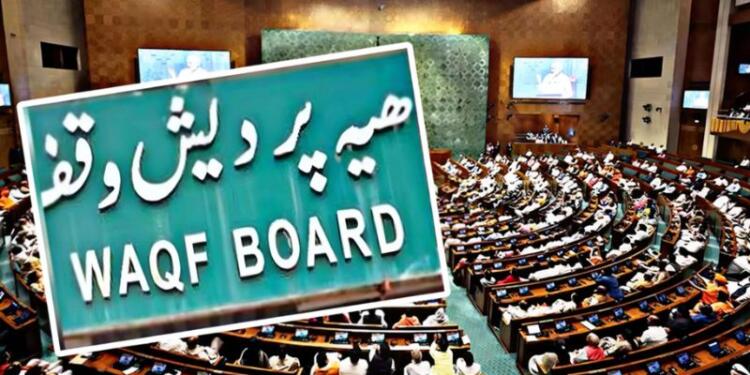The Waqf Board is often pitched as a noble protector of Islamic tradition—mosques, cemeteries, and charity tied tightly to Sharia’s rules. The 1995 Waqf Act gave it a clear job: manage Muslim endowments and sort out disputes. Sounds righteous, doesn’t it? But it’s morphed into something else—a sprawling giant controlling 9.4 lakh acres, rivaling the railways and government for land dominance. A saintly overseer? More like a land-hungry baron cloaked in piety, clutching a prayer mat while eyeing its next grab.
“Arbitrary” barely scratches the surface. Take Tamil Nadu: the Waqf Board set its sights on an entire village—homes, farms, even a 1,500-year-old Hindu temple, its ancient stones a testament to India’s deep roots. Or imagine a farmer who’s poured his life into his land, only to get a notice claiming it’s Waqf property now, thanks to some vague story about his grandfather’s time. No proper court to challenge it—just a tribunal stacked to rubber-stamp the claim. Section 40 of the Act is the weapon: they can seize anything with a hunch, no evidence required, just a whisper of history.
Does Waqf Land Exist Beyond India’s Legal Reach?
Here’s the unvarnished reality: Waqf property isn’t outside India’s laws—it’s just been given a free pass to wreak havoc. The Act creates a shielded empire—disputes dodge regular courts, landing instead in Waqf Tribunals packed with loyalists who toe the line. Section 6 locks it tight: no appeals, no accountability. It’s not above the law; it’s a spoiled enforcer within it. Hindu temples? Strangled—state governments siphon their funds and micromanage their boards. Waqf? It snags land on rumors or faded legends, while India’s justice system looks the other way.
Is it untouchable? Not quite—the Constitution still rules. Article 26 grants religious groups control over their affairs, but Waqf has bolted far beyond that boundary. Entire villages claimed, temple lands nibbled away—it’s a power grab, not devotion. The 2024 amendment aims to fix this, putting District Collectors in charge instead of tribunals, a step toward balance. Muslims cry foul, saying their autonomy’s been shredded. Hindus argue it’s a long-overdue reckoning, a chance to curb a juggernaut that’s crushed their legacy. It’s not a rogue state; it’s a runaway force begging for restraint.
Why Can a Muslim Lead a Temple, but a Hindu Can’t Touch Waqf?
Here’s a stark hypocrisy in India’s “secular” facade. Hindu temples—like under Karnataka’s 1997 law—can have Muslims or Christians on their boards, with state hands plundering their wealth for political gain. Congress mastered that playbook: drain the temples, sprinkle the profits for votes. Waqf Boards? A Muslims-only citadel, entry barred. The 1995 Act insists on it—every member must be devout, a sacred seal. The 2024 bill cracks that open, letting non-Muslims step into leadership roles.
Why the disparity? Waqf’s tethered to Sharia—Muslim exclusivity is non-negotiable, a divine rule. Temples? No such armor—colonial habits and post-independence politics turned them into state playthings, while Waqf got a golden ticket under minority appeasement. A Muslim can oversee a temple, pocketing its earnings, but a Hindu’s shut out from Waqf’s domain—a gut punch to India’s fairness.
If Hindus Are Outsiders, How Can They Be Waqf Donors?
Islamic doctrine is rigid: a waqif—the one dedicating land—must be Muslim, no exceptions. Waqf is Allah’s realm, and non-believers don’t belong. Yet, the current Waqf law, tweaked in 2013 by Congress for peak Muslim appeasement, allows anyone to contribute, no faith required. The 2024 bill tightens it back—only Muslims with five years of practice can donate. Muslims argue it’s a spiritual matter—how can a non-believer align with its essence? Hindus counter: if it’s just management, not worship, why the fuss? Look at Turkey or Egypt—Waqf’s religious core got secularized, state control overriding dogma. India’s lagging—Hindus want a say. To Muslims, Waqf’s their heritage; to Hindus, it’s a machine stomping their ancestral ground. A Hindu donor’s off-limits, but a Hindu leader could level the playing field.
The Bottom Line
It’s March 2025, and this clash is roaring. The Waqf Board started as a religious outfit but ballooned into a land-hoarding titan, flexing its muscle whenever it pleases. It’s not beyond India’s laws—it’s been handed a throne while Hindus languish under state shackles. Forcing Hindu voices into Waqf’s ranks and clipping its reach ignites the streets—it’s not just about turf; it’s Hindu dignity clawing out from decades of suppression. Muslims feel their roots threatened; Hindus see a shot at evening a skewed score. Muslims have their case, but Hindus carry the wounds—it’s time the balance shifted.
Real-world examples stoke Hindu anger. In Tamil Nadu’s Tiruchirappalli, the Waqf Board targeted 389 acres in Thiruchendurai, including a 1,500-year-old Chola-era Sundareswarar Temple, enraging locals with ancestral titles. Farmer Rajagopal faced a Waqf NOC hurdle to sell his land, sparking a 2023 court freeze after protests. In Karnataka’s Vijayapura, 1,200 acres of farmland were labeled Waqf in 2024, with officials later admitting a “record mistake” under pressure. Maharashtra’s Ahmednagar saw the board claim an ASI-protected tomb in 2006, dragging out a legal mess for years. Delhi’s Metro lost ₹200 crore and two years near Jama Masjid in 2018, stalled by Waqf demands over public good. These cases sharpen Hindu demands for fairness.
Waqf’s also an exclusive clique—SCs, STs, Pasmandas, and women get no say, sidelined by a privileged few under a pious banner. The 2024 amendment breaks that mold, forcing inclusion of women, marginalized Muslims, and non-Muslims, hauling Waqf into a fairer, clearer age. This isn’t just change—it’s India rising, fists up. Waqf’s free rein—snatching temples, villages, lives—has gone unchecked too long. The 2024 shift is a beginning, but it needs muscle: stronger Hindu input, tighter audits, and a deep dive into those 9.4 lakh acres. History’s tangled—conquests, religious strife, colonial meddling—but today’s battle is for India’s core. Hindus have waited; Waqf’s unchecked era is nearing its end.


























